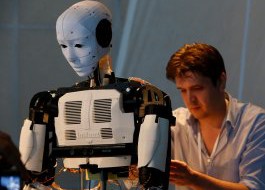The Microsoft co-founder believes so strongly in the idea of robots coming for people's jobs that he's already begun thinking about how companies ought to pay tax on those robots to make up for lost income tax. "You cross the threshold of job-replacement of certain activities all sort of at once," Gates told Quartz recently. "So, you know, warehouse work, driving, room cleanup, there's quite a few things that are meaningful job categories that, certainly in the next 20 years [will go away]." The "Shark Tank" investor and Dallas Mavericks owner has remarked on several occasions that artificially-intelligent robots will kill off jobs in droves in the coming years. In February, Cuban criticized President Trump's plans to bring back American factory jobs as a sign of the president's poor understanding of technology and business. "People aren't going to have jobs," Cuban said. "How does [Trump] deal with displaced workers?" Khosla, a Sun Microsystems co-founder and prominent venture capitalist, has stated that 80% of IT jobs are at risk of automation in the coming decades. Many of the jobs Khosla envisions involve rote, repetitive data entry or simple troubleshooting. "I think that's exciting," he said at a November 2016 conference of the impending robot takeover. The eBay president and CEO has said artificial intelligence could eliminate entire industries within the next decade. But he remains optimistic, so long as employers recognize their role in training workers who may get displaced. "As AI evolves, job training must evolve with it," he wrote earlier this January. "There are already big shortages in fields closely related to AI, such as data science, engineering and operations." The Tesla CEO told CNBC in a November 2016 interview that he believes robots will take so many jobs by the mid-21st century, the government will start paying people salaries even if they don't work. The idea is called universal basic income, and Musk is the latest tech entrepreneur to support the idea as a solution to robotic automation. "I am not sure what else one would do," he said. "I think that is what would happen." Another basic income advocate, the Y Combinator president is almost positive robots will dominate industrialized economies in 100 years, and pretty sure they'll create a big dent within the next 20. "The question I find myself struggling with the most is what will happen to the economy and to jobs as automation becomes more and more of a powerful force," Altman said in a recent video chat. Amazon's chief executive has embraced the power of AI for years. In his own factories, there are more than 45,000 robots ferrying packages from one spot to another. Amazon has also announced plans to build employee-free grocery stores. "It's probably hard to overstate how big of an impact it's going to have on society over the next twenty years," he said at a recent Code Conference. Hughes, a Facebook co-founder, says a future filled with automated work is inescapable. "The reality is that work has changed," he told NPR. Many of the jobs once held by humans are now driven by computers, and increasingly so. Hughes himself has supported basic income as a solution to the growing inconsistencies (and insecurity) of jobs. Google's engineering director isn't exactly panicking about the future of work. Kurzweil sees robots as a force for good, at least in terms of freeing people up to do what it is they love. He has predicted that by the 2030s, AI will outpace biological intelligence and self-driving cars will be everywhere. "We are going to have new types of jobs creating new types of dollars that don't exist yet and that has been the trend," he told Entrepreneur.
Bill Gates

Mark Cuban

Vinod Khosla

Devin Wenig

Elon Musk

Sam Altman

Jeff Bezos

Chris Hughes

Ray Kurzweil

Advertisements
 Advertisements
Advertisements




